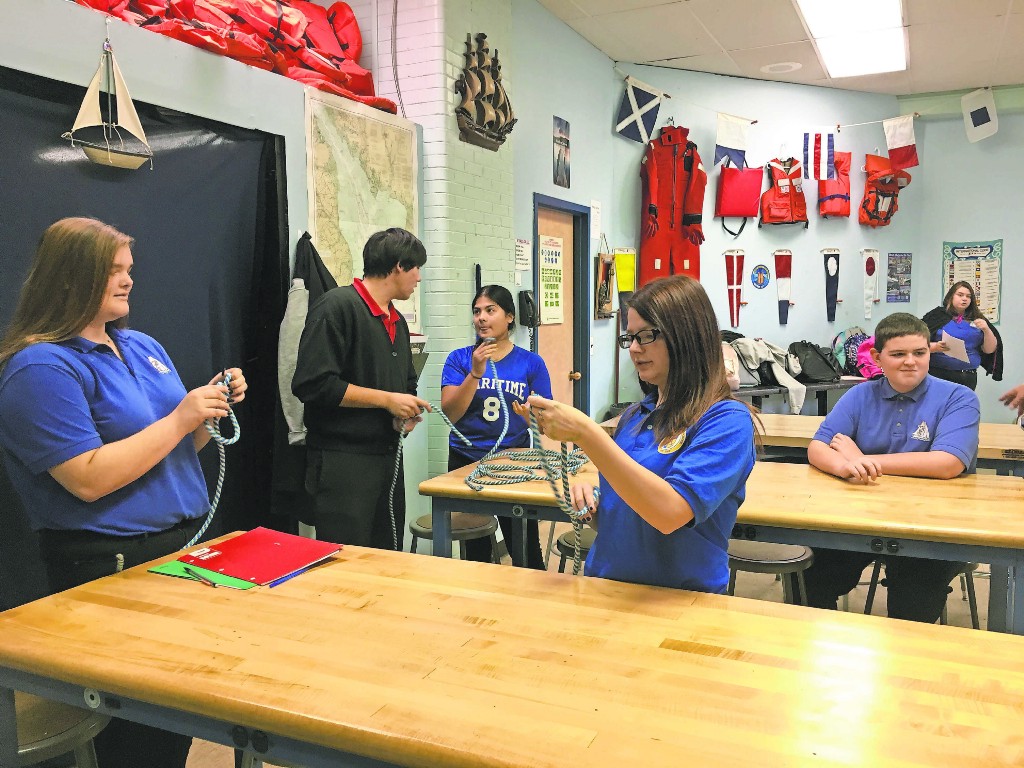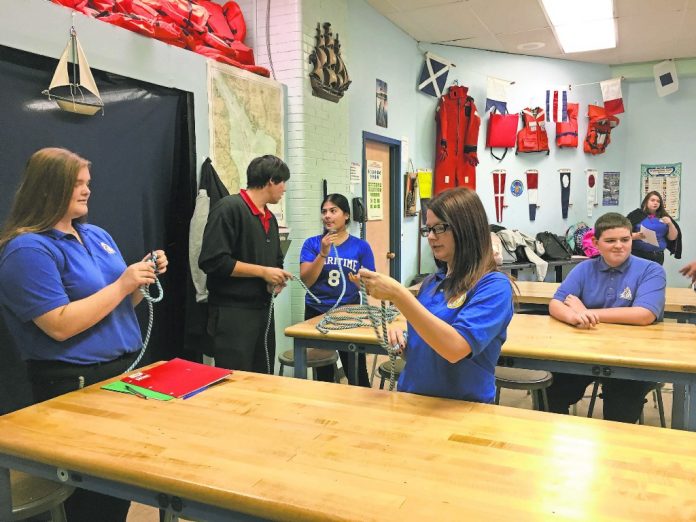Cadets — not students — at Maritime Academy Charter High School experience high school with a maritime theme.

By Tom Beck
Don’t call them students.
Cadets at Maritime Academy Charter High School experience high school a little differently than most teenagers across the country.
For starters, maritime terminology is used throughout the school. Students are called cadets, the bathroom is called the head and the first, second and third floors are referred to as the first, second and third decks.
In addition to taking typical high school classes such as math, science, art and history, the cadets at MACHS take three maritime classes throughout the course of their high school tenure.
In freshman year, it’s Introduction to Maritime Studies, where students learn about “different types of vessels, the jobs of the different vessels — stuff like that,” said Josh Weir, a senior at MACHS who also happens to be the democratically elected president of the school’s student government.
Sophomores take a class called Deck Operations.
“That’s all about how to work on a vessel,” Weir said. “Safety on a vessel, the procedures and operations aboard the vessel.”
Juniors and seniors take “maritime opportunities classes,” according to Weir. “The maritime opportunities class serves to [tell] you [about] maritime jobs. They tell you what’s out there, the industry, stuff like that. So you really get a sense of after high school where you’re going.”
“Where you’re going” depends heavily upon the student. Many students go into the armed forces, specifically the three maritime branches: the Navy, Marines and especially the Coast Guard.
Many of the students who are interested in this field will take part in the annual three-day boot camp field trip to the United States Coast Guard Training Center in Cape May, New Jersey, with Chief David Hentnick, a teacher at the school who also served in the Coast Guard for 23 years. He was stationed at the Cape May training center for four of those years.
How does boot camp change the students for the better?
“The biggest thing that we see is confidence,” Hentnick said. “That’s one of the biggest things is they come back and they say, ‘Wow I did that.’ … It gives them a good idea of what to expect if they want to join the military.”
“The most unique part of [boot camp],” MACHS’ CEO Ed Poznek said, “is that next year everybody wants to go back.”
Others go to college.
Many students who choose college go to one of only a handful of maritime-themed colleges. There’s a big one in Maryland called the Maritime Institute of Technology and Graduate Studies and there’s also the State University of New York Maritime College in New York City and the Massachusetts Maritime Academy in Buzzards Bay, Massachusetts.
“There’s a niche of maritime universities,” said Aimee Bogan, a counselor at the school. “Because there’s so few high schools that are maritime oriented, when our students go to visit these universities, they’re kind of already ahead of the curve because they already know the basic skills and knowledge and terminology.“
“When they graduate, if they want to go to sea, they could be making the better part of $100,000 right out of college,” Poznek said.
A third option is to go straight into the workforce. According to Poznek, the maritime industry needs young blood, since a lot of ship captains are entering their 60s and 70s.
The thing about maritime studies is that learning about it in a classroom will get you only so far. It’s important to get hands-on experience outside the classroom to really learn.
MACHS senior Nichole Garcia was able to do just that during her summer internship aboard the USS Niagara.
Garcia went only for a two-week program, but the captain on board the ship invited her to stay for a summer-long internship, so she did. She learned a lot.
“As a trainee, I was shy. I was not outspoken. I stood to my corner, but on the boat you have to be loud,” she said. “You have to repeat your orders and your commands very loudly because the ship is moving, the engine’s running sometimes and they will not hear you. And it gets chaotic so you have to be aware and very focused. I had to start having other people learn to trust me instead of me trusting other people.”
Garcia, like many of the students at MACHS, greatly appreciates the school she goes to and all the opportunities presented to her by attending it.
“Growing up in a Hispanic household, we don’t grow up with chances to do things like other average people do,” she said. “When I came to Maritime, it opened up my eyes to see that we can do this. We just need to have the push and the chances that the school gives us in order to get into opportunities to go into jobs that give us a career and a life for the future.”
Maritime Academy’s middle school is at 2275 Bridge St., in the Frankford Arsenal Business Center. The high school is at 2700 E. Huntingdon St. in Port Richmond.
To learn more about Maritime Academy, visit the school’s website at maritimecharter.org ••
Tom Beck can be reached at [email protected]





